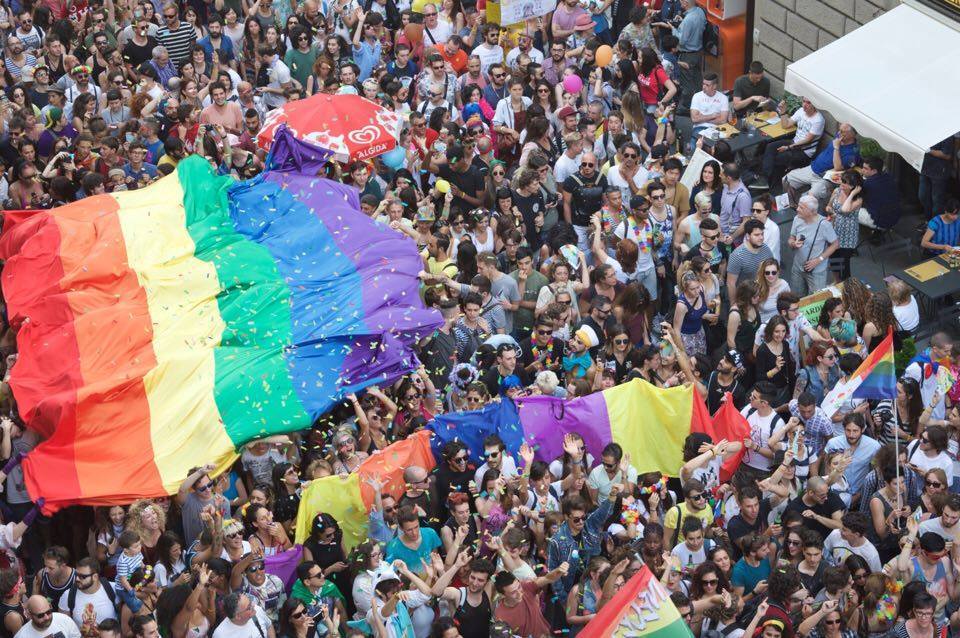ILGA-Europe has recently issued its annual ranking on the LGBT community’s situation in Europe. Italy positions itself 32 out of the 49 European countries, demonstrating that there is still a need for improvement to guarantee a safe environment for LGBT people within the country.
This May, ILGA-Europe published “Rainbow Europe”, its annual rating of the 49 European countries based on the study of European states’ laws and policies that have a direct impact on LGBT rights. The ranking scale goes from 0 percent, representing a gross violation of human rights, to 100 percent, representing a full respect for human rights. The position of the European states in the scale varies a lot; while in some countries the reached outcomes are quite positive, in others LGBT people’s equality and safety is far from being guaranteed.
“The incredible achievements of the past decade are at stake. Let’s not make the mistake of thinking that we have achieved equality. There are too many signs that trends like populism and nationalism aren’t political buzzwords—they can have a lasting impact on the lives of LGBTI people in Europe,” commented in a press release Evelyne Paradis, executive director of ILGA-Europe. “There are too many signs around us that many of the recent wins are fragile. So let me say it again, we are nowhere near done,” he added.
The Italian case
Italy is among the European countries with the highest level of LGBT discrimination, placing itself in the 23rd position of the ranking with a percentage of 26.67. This means Italy has not made any improvements since the 2017 report.
This summer, the Italian families minister Lorenzo Fontana, who is from the far-right Lega Nord party, publicly declared his opposition to the recognition of children conceived by same-sex parents abroad. “The current family law situation cannot fail to take account of what has been happening in recent months on the issue of the recognition of parenthood, with the registration of children conceived abroad by couples of the same sex via the use of practices that are banned by our laws and should stay so,” he told a parliamentary hearing. The minister, who has never hidden his conservative ideas and his strong faith, had previously denied even the existence of rainbow families in the country during an interview with the Italian newspaper Corriere della Sera.
This is only one example of the many homophobic declarations made in the Italian public discourse. According to a recent report by ISTAT, the Italian National Institute of Statistics, 40.3 percent of Italian homosexuals/bisexuals claim to have faced discrimination at school, university or work.
The Italian legislation on LGBT rights
Despite this scenario, Italy does not have any specific legislation to punish hate crimes perpetrated against LGBT people. In fact, the Italian law provides only specific aggravated circumstances to crimes motivated by ethnic or religious hatred and those associated with the nationality of the victims, but sexual orientation is not among these.
According to the Rainbow Europe report, even if in 2016 the Italian parliament passed the law to give legal recognition to same-sex couples, the whole legislative process was anything but straightforward. The bill itself was changed from its first draft to overcome the strong opposition perpetrated by right-wing parties in the parliament; the provision that allowed second-parent adoption was removed and the language used in the bill to refer to same-sex couples was derogatory.
“It’s a useless and empty law; they can scrap it. As parents, we challenge anyone to accept a law that hurts our dignity and our children,” said in a phone interview Marilena Grassadonia, president of Famiglie Arcobaleno, an LGBT parents’ association.
A possible explanation
One answer to this diverse outcome in Europe and on why European countries like Italy fail to institutionalize norms on LGBT rights can be found in O’Dwyer and Schwartz’s research. In their analysis of the reasons behind Latvia and Poland’s backlash on the adoption of EU non-discrimination norms regarding sexual minorities, they explained that a central role was played by the two countries’ conservative religious and national discourses.
A demonstration of this theory can be found in a case that happened in Italy last summer, when a same-sex Italian couple were at the centre of an episode of discrimination while booking a holiday home in Calabria. After they reserved a place at a Santa Maria guest house, the owner contacted them with text messages to gain additional information about the couple. When he discovered that they were homosexuals, he refused to host them stating “we don’t accept gays and animals”.
During the subsequent interview with Radio Capital, the owner of the guest house specified that it was not his intention to put dogs and homosexuals at the same level, but remained firm in his decision. According to him, since the guest house was a private structure and he believed in the Christian value of traditional families, it was within his rights to reject the hosting request of the same-sex couple.
However, religion is not the only factor influencing the public opinion and the socialization of LGBT rights. Transnational actors, such as intergovernmental organizations and NGOs, play a leading role in applying pressure to the domestic arena for the norm’s empowerment. In fact, they help to bring visibility to the topic, which is a fundamental aspect of the process of uncovering existent LGBT identities and engaging them in a possible mobilization for the norm diffusion.
As described in the ILGA Europe report, the salience given to the public discussion surrounding the approval of the same-sex couples law in Italy was quite high. Although opinions during the public debate on the topic were heterogeneous and contradictory, the outcome was that 69 percent of the Italian society supported civil unions between homosexuals.
While some improvements have been made regarding the empowerment of more inclusive norms for the Italian LGBT community, much work is still required in that direction. The change has to come within the Italian domestic arena as the lack of proper legislation to protect and ensure equal rights for the LGBT population is mostly due to specific aspects of Italian politics and culture.






